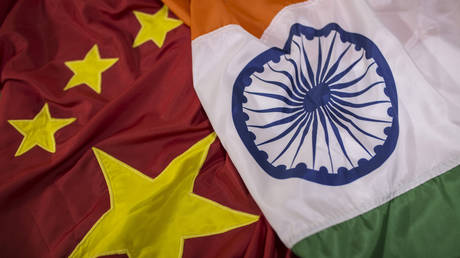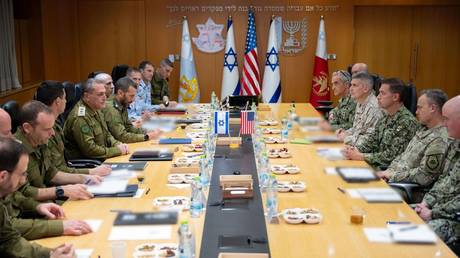
Defense chiefs hold talks on strengthening ties as US warns of threats from China and Russia
US Secretary of Defense Lloyd Austin hosted his Indian counterpart, Rajnath Singh, on Monday, calling for closer military ties between the countries and warning of security threats posed by China and Russia.
“We’re meeting at a critical moment in the US-India defense partnership,” Austin told Singh as Monday’s talks began. He added that Washington and New Delhi both believe in a “free and open Indo-Pacific” underpinned by respect for national sovereignty and the rule of law, but “we’re facing urgent and mounting challenges to this shared vision.”
Beijing is undermining security in the region by building “dual-use infrastructure” along its border with India and making unlawful territorial claims in the South China Sea, Austin said. “The United States stands with India in defending their sovereign interests,” he pledged.
Austin argued that like China, Russia is trying to “change the status quo by force,” adding, “Russia’s invasion of Ukraine and the humanitarian devastation that it has created are blatant attempts to undermine the international order that is grounded in the rules and the principles that we share.”
The US defense chief said that as the world’s largest democracy, India is “central to this rules-based order,” and he called for collaboration with “like-minded partners.” Those ties may include co-development of weapons.
Austin and Singh followed their talks by holding a so-called 2+2 meeting with US Secretary of State Anthony Blinken and Indian Minister of External Affairs Subrahmanyam Jaishankar. “This is a momentous moment in global affairs, and I think as a result, this partnership is even more consequential and more vital,” Blinken said.
However, the partnership has been strained in recent weeks amid efforts by the US and its Western allies to punish and isolate Russia over the Ukraine conflict. Late last month, a top US national security official warned India that there will be “consequences” for countries that try to “circumvent” Washington’s sanctions campaign against Moscow.
“We are keen for all countries, especially our allies and partners, not to create mechanisms that prop up the ruble and that attempt to undermine the dollar-based financial system,” deputy national security advisor Daleep Singh told reporters during his visit to New Delhi on March 31.
President Joe Biden’s top economic advisor, Brian Deese, reiterated those concerns last week, saying Washington had warned India that it would face significant and long-term costs if it aligned strategically with Russia. “There are certainly areas where we have been disappointed by both China and India’s decisions, in the context of the invasion,” he said.
India has declined to impose sanctions against Russia and has ramped up purchases of Russian oil. Indian and Russian officials also have discussed a ruble-rupee payment mechanism for trade between the countries, bypassing the dollar and the euro.
Another source of tension between Washington and New Delhi is India’s historic reliance on Russian-made weapons. India has ordered five S-400 anti-aircraft systems from Russia – in defiance of a warning from the US against the $5.5 billion deal – and it reportedly has an option to purchase more of the surface-to-air missiles.
Austin told US lawmakers last week that it’s not in India’s best interests to continue buying Russian weaponry, and the Pentagon is working with New Delhi to reduce its reliance on Moscow.




